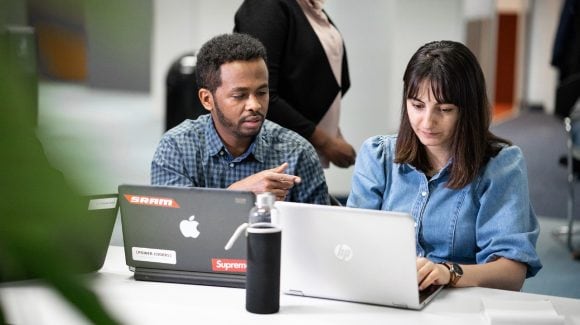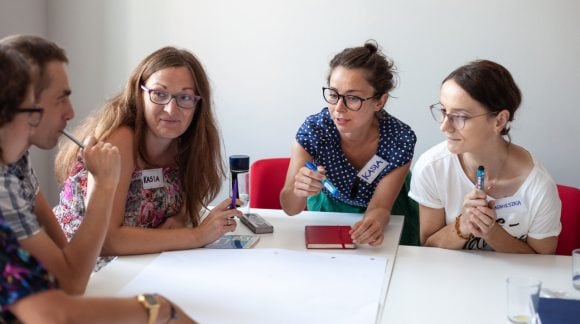A global community
We’re committed to supporting the communities in which we live and work. Our Community Impact program operates in all regions to make connections where they matter most.

![]()
header.search.error
We’re committed to supporting the communities in which we live and work. Our Community Impact program operates in all regions to make connections where they matter most.
Key highlights
Creating a global ecosystem that connects people and businesses to ideas, partners and opportunities is as much about helping people fulfil their individual potential as it is about bringing benefits to society as a whole. By focusing on social impact, whether for one individual or a whole community, we can help to build a fairer society, a more prosperous economy and a healthier environment.
Creating a global ecosystem that connects people and businesses
to ideas, partners and opportunities is as much about helping
people fulfill their individual potential as it is about bringing
benefits to society as a whole.
Our Community Impact program is a powerful vehicle to generate social impact and address issues associated with wealth inequality. We work with our local communities to understand the issues they’re facing and develop long-term partnerships to catalyze sustainable change in people’s lives. We focus on supporting education and the development of skills, as key tools in addressing wealth inequality – and areas where our support can make a differential impact. And we enable our employees to help deliver that change through volunteering, which in turn delivers a positive impact on our culture as a firm.
While we always have the bigger picture in mind and operate as one firm with one set of values, our regional Community Impact programs allow us to focus on the issues relevant to our local communities. Take a look at some of our key partnerships from 2021.
Welcome to the Swiss workplace: with Powercoders
UBS supports Powercoders, a coding academy for refugees and migrants in a bid to integrate participants into our community and to close the tech talent gap. Both the funding the firm provides and the UBS employees who volunteer (as IT trainers, job coaches and interview trainers) directly help participants to enter the Swiss employment market. After an initial launch in Zurich in 2019, Powercoders was able to secure additional financial support from the UBS Foundation for Social Issues and Education and extend its offering to the Romandie region by opening a “Powerhouse” in Lausanne, offering the same services.


Through internships, we also open the door to our part of the corporate world in Switzerland. Today, 20 former Powercoders work for UBS, either on fixed contracts or as interns in various parts of the firm, including Group Technology. One of them, is Tenzin Gyadhotsang.
“I remember the day I was accepted as if it were yesterday,” he said with a smile. “It was the 9 January and I was so happy to be the first Powercoders participant to receive a permanent position at UBS.”
As a result of the partnership, individuals in need develop the skills to support their own autonomy, Swiss society benefits from skilled tech workers and reduced welfare costs, and our firm diversifies its talent pipeline with fantastic new talent – the Powercoders organization, its participants, the volunteers and UBS all benefit from this collaboration.
Leveling the playing field for female founders of color in the US
Project Entrepreneur, a UBS program designed to level the playing field for female founders, launched the Democratizing the Friends & Family Round program to award USD 25,000 grants and virtual coaching and skills building to 40 female founders of color leading early-stage, high-growth companies.
Women entrepreneurs of color have historically been denied equitable access to capital of all forms. Black and Latinx female founders receive less than one percent of venture capital, but the funding gaps start far before founders of color prepare to raise their first venture round. Nearly 40 percent of early-stage entrepreneurs raise initial funding through a Friends and Family investment round. However, because of the racial wealth gap in the US – the disparity in median wealth between people of different races – many entrepreneurs of color do not have access to a network that can provide them with the necessary funding. As a result, entrepreneurs are prevented from testing their innovations, hiring key talent, and having the runway to grow and raise future investments.
Any time you get that support of people who believe in you and
want to contribute to that journey, it makes a huge difference,
and I am just so thankful.
After receiving more than 12,000 applications to the program, which was launched in partnership with Hello Alice, a multichannel platform that helps businesses start and grow, 65 UBS volunteers reviewed submissions to arrive at the 40 finalists from across the US. Some of the winning companies included STEAM-focused gaming for girls, artificial-intelligence-powered beauty brands, med-tech innovations, and artisanal food products.
“It’s hard building a company from scratch,” said grant recipient Dr. Christine Izuakor, Founder & CEO of Cyber Pop-up. ”Any time you get that support of people who believe in you and want to contribute to that journey, it makes a huge difference, and I am just so thankful.”
Since 2015, Project Entrepreneur has supported female founders with programs to increase their investment readiness, connect them to the networks and resources they need to grow and scale their companies, and expand the ecosystem of support that can help women entrepreneurs succeed. To date, the program has trained 1,800 female founders with alumni going on to raise more than USD 60 million in capital.
Virtual volunteering across the Asia Pacific region
COVID-19 restrictions made it possible for employee volunteers to get involved in projects outside of their own locations. How? All the thirteen markets in APAC joined forces and were connected virtually to support more than 60 community non-profit-organizations, reaching out to the underserved youth and children whose learning opportunities were hard hit by the pandemic.
It is truly inspiring to see the socially and economically vulnerable children and youth encouraged by UBS volunteers to take a step forward. Many are deprived of the opportunities that we may take for granted.
In total, the APAC 2021 Regional Volunteering Experience (RVE) ran more than 30 volunteering events on 15 days, during which 635 employees were involved and contributed over 1,000 hours to help communities across Asia Pacific. The largest and most comprehensive staff volunteering program to date, it offered a variety of volunteering opportunities, including a pen-pal cultural exchange program between Hong Kong and Japan (which encouraged children to learn about other cultures and languages), a communication skills workshop with teenagers in the Philippines, a toy and book appeal in Australia, read a story a day on international literacy day in India, and virtual activities with school students and senior citizens in Singapore.
“It is truly inspiring to see the socially and economically vulnerable children and youth encouraged by UBS volunteers to take a step forward. Many are deprived of the opportunities that we may take for granted,” said Kumiko Hori, Asia Pacific Head of Community Impact.
Supporting education and skills in Poland
The Stella Virium Foundation promotes life-long learning, education and the acquisition of new skills, primarily for people who might be otherwise excluded from these opportunities. Since UBS began working with the Foundation in 2014, 300 people have graduated from the program, which has supported participants to re-enter employment or change the direction of their career. And 155 participants benefited from the program in 2021.


The Foundation helps people to understand the requirements associated with working in a business environment, including multinational corporations, as well as to acquire and develop the skills needed to succeed in that environment. "I believe that this is a great opportunity for people who do not work in corporations to find out what work in a large international company looks like and what is needed to get there,” explained one of the volunteers.
UBS has supported training sessions to develop both soft and technical skills with funding and volunteer support. Soft skills development focuses on areas such as communication and teamwork, while technical skills training increases knowledge of different industries, as well as recruitment processes – complemented with support in actual job searches, applications and interview practice. UBS volunteers act as mentors and coaches, using their experience to help with mock interviews and CV reviews. Overall, the program is designed to increase applicants’ employability skills and chances of getting a job – one graduate of the program was even able to secure an internship at UBS in our Group Finance department, developing their own career path and securing new talent for UBS.
While they take different forms, reflecting the differing issues and needs of the communities in which we operate, these four examples illustrate a few of the ways in which we are supporting education and the development of skills to help bring opportunities to people who need them. And we’recommitted to continuing to support the communities in which we work, right around the globe. By connecting people for a better world – one that’s fair, sustainable and gives everyone the opportunity to thrive – and honoring our commitment to support the United Nations Sustainable Development Goals, we all have a role to play in reducing the world’s wealth inequality.